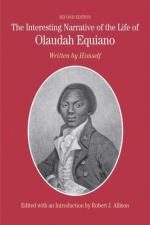The natives are extremely cautious about poison. When they buy any eatable the seller kisses it all round before the buyer, to shew him it is not poisoned; and the same is done when any meat or drink is presented, particularly to a stranger. We have serpents of different kinds, some of which are esteemed ominous when they appear in our houses, and these we never molest. I remember two of those ominous snakes, each of which was as thick as the calf of a man’s leg, and in colour resembling a dolphin in the water, crept at different times into my mother’s night-house, where I always lay with her, and coiled themselves into folds, and each time they crowed like a cock. I was desired by some of our wise men to touch these, that I might be interested in the good omens, which I did, for they were quite harmless, and would tamely suffer themselves to be handled; and then they were put into a large open earthen pan, and set on one side of the highway. Some of our snakes, however, were poisonous: one of them crossed the road one day when I was standing on it, and passed between my feet without offering to touch me, to the great surprise of many who saw it; and these incidents were accounted by the wise men, and therefore by my mother and the rest of the people, as remarkable omens in my favour.
Such is the imperfect sketch my memory has furnished me with of the manners and customs of a people among whom I first drew my breath. And here I cannot forbear suggesting what has long struck me very forcibly, namely, the strong analogy which even by this sketch, imperfect as it is, appears to prevail in the manners and customs of my countrymen and those of the Jews, before they reached the Land of Promise, and particularly the patriarchs while they were yet in that pastoral state which is described in Genesis—an analogy, which alone would induce me to think that the one people had sprung from the other. Indeed this is the opinion of Dr. Gill, who, in his commentary on Genesis, very ably deduces the pedigree of the Africans from Afer and Afra, the descendants of Abraham by Keturah his wife and concubine (for both these titles are applied to her). It is also conformable to the sentiments of Dr. John Clarke, formerly Dean of Sarum, in his Truth of the Christian Religion: both these authors concur in ascribing to us this original. The reasonings of these gentlemen are still further confirmed by the scripture chronology; and if any further corroboration were required, this resemblance in so many respects is a strong evidence in support of the opinion. Like the Israelites in their primitive state, our government was conducted by our chiefs or judges, our wise men and elders; and the head of a family with us enjoyed a similar authority over his household with that which is ascribed to Abraham and the other patriarchs. The law of retaliation obtained almost universally with us as with them: and even their religion appeared to have shed upon us a ray of its glory, though broken and spent in its passage, or eclipsed by the cloud with which time, tradition, and ignorance might have enveloped it; for we had our circumcision (a rule I believe peculiar to that people:) we had also our sacrifices and burnt-offerings, our washings and purifications, on the same occasions as they had.




